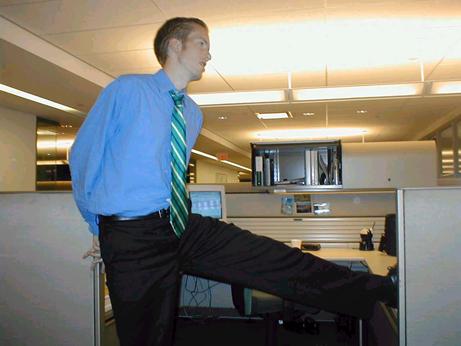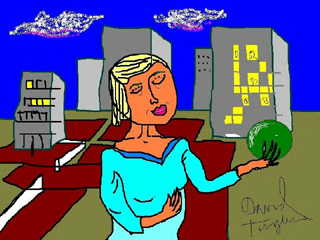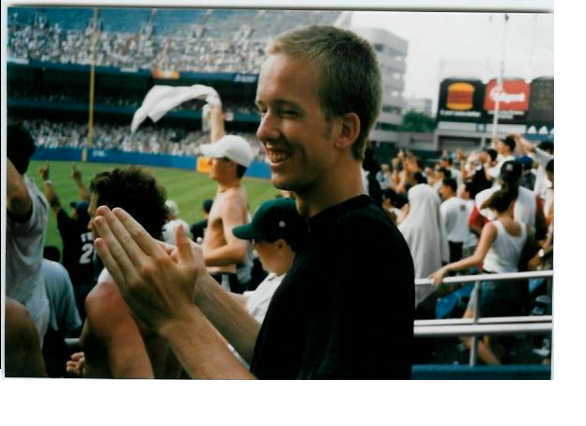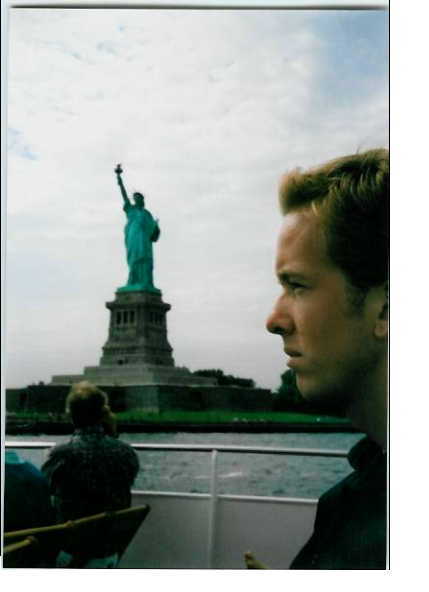Petra Ehnar
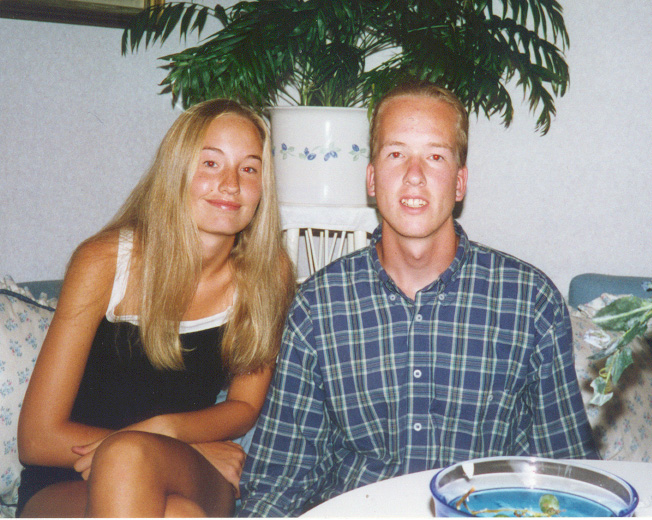
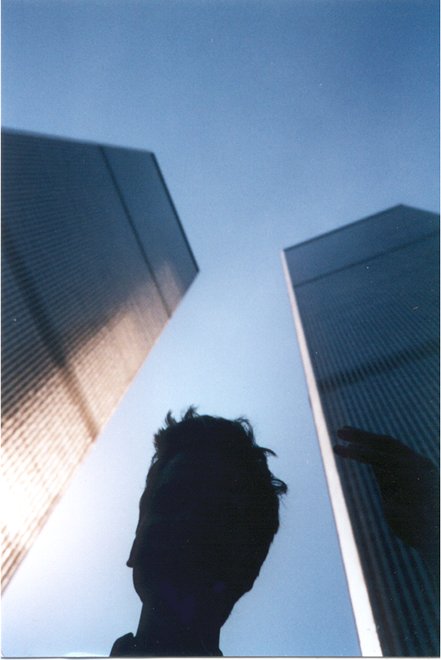
Phoenix, Arizona - It is difficult to find comfort and peace with life since the events on the 11th of September. When I think of what that day means to me, I get sad, angry, scared, and tearful. I also find myself at a loss. Not just for all the life that was lost, but I find myself at a loss for words. My friend Swede was on the 100th floor of the first tower of The World Trade Center on the morning of September 11th. It is now the 23rd of September and today is the day that Swede's family and friends are having a memorial service for him. His body has not been found. I think of Swede and I think of all the people who are now without their fathers, husbands, mothers, wives, sons, daughters and friends. These people were all loved by someone. I don't understand how the hijackers could be filled with so much hatred for people they didn't even know. I don't understand how God could let this happen? I don't understand how one human could do this unthinkable, horrific action to another human being. I am in a state of not understanding and sadness. As I ramble on, I realize there are not enough words to express how I feel. On the Friday after the attacks, I was in the store with my mother when I found a card that made me feel a little bit of comfort. It said, "Just when the caterpillar thought the world was over, it became a butterfly." - Anonymous
I know that life will go on. I know this because life is already going on with an eerie sense of normalcy. I also know this when I look at my son and he makes me smile and all the sad thoughts and feelings go to the back of my mind and heart. They are not gone. I know this because they float to the surface every now and then. I need to concentrate on the fact that I was honored and privileged to have known Swede, even if his life was cut short. The optimist in me would like to think that just like everything else in life, there was a reason this happened. Hopefully, something good and positive will come from this mess of emotions and the jumble the world has become.
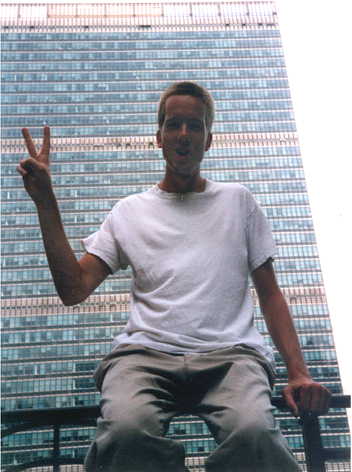
The death of David Tengelin on Sept. 11 forever changed his brother's life. Patric Tengelin, 27, was born and raised in Gothensburg, Sweden, and today lives in London, where he is studying economics at Greenwich University. He has a mother, Britt Ehnar, father, Peter Tengelin, and sister, Petra Ehnar. On Sept. 11, Patric was at work in Sweden. Inspired by his brother's death, Patric has adopted the following motto: "When political systems clash like they did on September 11, innocent people pay the price. In stark contrast to the monstrous methods of the terrorists, my brother was an advocate of non-violence. He loved the cultural diversity of the Big Apple like I do the melting pot of London. David lived a rich life in a minimalistic manner and he was a true global citizen. David died young, too young. He only lived to be 25 years. I have made it my mission to carry on my brother's beliefs and not let up in the struggle to promote an open democratic society." Patric wrote, "In memory of my brother" on Oct. 27 and "In remembrance of David Tengelin" on Nov. 23.
London, England -
In memory of my brother, David 18.3.76 - 11.9.01
I remember it like it was yesterday even though this was twenty years ago now. David and I were all set to go on our very first moose hunt. It is an annual Swedish tradition that lasts for a couple of weeks each fall. Our mother had dressed us so that we would not get cold as it was rainy and miserable outside. I handed one of our wooden rifles to my brother and off we went. Some 100 yards from the house, we lay down behind a couple of trees, about 20 feet apart, and waited anxiously while taking aim at anything that moved.
It was not long before we started getting bored. But just as we were about to pack up and head back home we heard something that caught our attention. Lo and behold, it was a moose! This was the moment we had been gearing up for and we were both paralysed. A great majestic moose came running through our back yard and my brother and I froze, unable to move as the enormous animal came trampling through the vegetation in our direction. Never had I been so scared in my whole life. We were right in its path and by now I was trembling with fear. When the moose had passed us, I looked up and saw the amazement and horror in my brother's face.
We were unable to speak at that moment but both of us got up at the same time and ran as fast as we could up to the house where mom was waiting for us. We were out of breath, but eager to tell our story. And the story is taken from the same spot in the woods, where we left our toy rifles in a hurry. We spent the rest of that day indoors, planning in detail and preparing mentally for the next time we would come eye to eye with a moose.
After September 11, 2001, there will never be a next time for my brother and I to go on a moose hunt. But my memory of David will forever be as vivid and precious to me as the day when we went hunting for moose in our back yard.
"I will never forget but always honor you."
In remembrance of David Tengelin
I was sitting in front of my computer and monitoring the movements in the stock market and trading whenever an opportunity would arise. It was ten minutes to three, local Swedish time, and it had been a quiet day when suddenly the market knee-jerked and stocks sold off across the board. But why? What had happened to cause this nosedive? Reports started coming in about a plane having hit the World Trade Center. My first reaction was one of concern as my brother worked on the 100th floor in one of the Twin Towers. As I went to switch on the TV I kept thinking that it was probably a small private plane, and that it, like a sparrow that flies into a window, got squashed and fell helplessly to the ground. I knew that there would be casualties, but I hoped for no more than the unfortunate passengers who were seated in the plane.
When I saw the first pictures from New York I was absolutely horrified. Black smoke was pouring out of the top twenty floors in what seemed to be increasing with intensity. I just stood there in disbelief, unable to do anything. It was quickly brought home to me that it must have been a much larger plane than what I had initially pictured it to be. And then, out of nowhere, comes another commercial airliner and slams into the other tower. I froze and my jaw dropped. I could not believe what I had just witnessed. It was now beyond all doubt that this was an act of terror and I damned the terrorists.
After having watched the clip a couple more times I began pacing back and forth, trying to remember in which of the towers my brother had his office. I clung to the hope that he worked in the second building that was hit. That would have given him fifteen minutes in which to react to the first airplane that hit the other building, run down the stairs and put himself in safety. It was agonizing watching both buildings on fire and not knowing whether David was trapped in the inferno.
I am David's big brother and as such it is my duty to protect him. I would have done anything to save him, and not think twice about coming to his rescue. Now I could only watch the disaster unfold before my eyes on live television. As the first tower tumbled to the ground I called my brother's cell phone. The line was busy! That meant that he may be alive and that gave me a glimmer of hope. I called again. Still busy! He was probably on the phone to let everyone know that he was all right. My heart was racing and I was now more hopeful than disillusioned. I went back to watch the TV just in time to see the second tower fold and crumble. It was surreal. The next time I called, I got his voice mail. Maybe he had been asked to switch off his cell phone if he were in the hospital...
My life has changed in a profound way since September 11. I am no longer dedicating my life to financial markets, but to the people I love, especially my mother and my sister. I am currently studying economics at Greenwich University in London, England. Whenever I need motivating, I recall the last words my brother spoke to me, "Good luck in London, I know you'll make it." My brother and I always supported each other in every way possible. Much the same way my sister and I do now, and that I know David and Petra have always done. My mother has always been there for us and done a fantastic job in bringing us up. However, it is only now I realise how much her children mean to her as I see the pain and anguish in her face as she mourns the death of her son.
My brother has been my hero and the greatest source of inspiration ever since he left for America six years ago. He lived a rich life in a minimalistic manner. He never complained although he had many worries. Like all of his colleagues, he had big dreams. Like David, most of them lost their lives to terrorism. Some people say that one man's terrorist is another man's freedom fighter. However, freedom will never be achieved through means of terror. My brother no longer harbours any worries but his dream still lives on. His dream was to live in a peaceful world without intolerance and wars. My dream is that of my brother's, but my worries are that we may see a repeat of the atrocities committed on September 11, 2001.
Upon Reflection, February 5, 2002
My passion and love for people from other cultures and different religions have not dissipated since September 11. There is fundamentally nothing wrong with mankind. However, when political systems fight each other for superiority, innocent people are caught in the line of fire. In a sense, the hijackers of the jetliners were victims of their beliefs, targeted by a manipulative leader, and held
hostages by their religious convictions. Some people argue that one man's terrorist is another man's freedom fighter, but freedom will never be achieved through means of terror. It is only when we bridge the gap that separates people who have been brought up in different parts of the world, with different values, that understanding and compassion can ultimately pave the way towards peace.
Terrorism must be rooted out. In order to defeat the adversary, our enemy has to be identified. Despite our differences, all people must have an equal say in world affairs. Democracy will only prevail after its opponents have been engaged in dialog. When everyone is incorporated into the global community, we will share common goals and joint responsibilities. That is how human dignity will be upheld and open society safeguarded. We all must be pro-active in preventing the next terrorist attack.
In remembrance of the following Marsh CAPS employees who perished in the World Trade Center catastrophe on September 11, 2001. God forbid it ever happens again.
David Tengelin
Christian DeSimone
Carl DiFranco
Ramzi Doany
Jennifer Kane
Dorota Kopiczko
Ana Centeno
Danielle Delie
Jean DePalma
Michael Zinzi
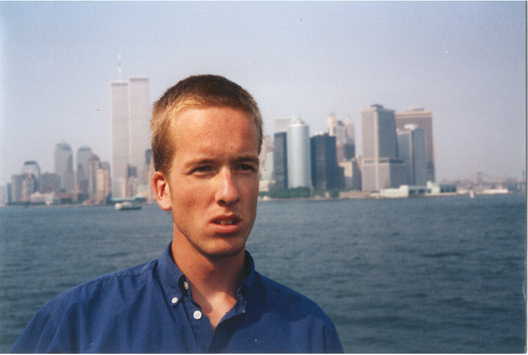
Britt Ehnar, a 52-year-old midwife, was born in Gothenburg, Sweden, where she continues to live today. On Sept. 11, she lost her youngest son, David, who is survived by his brother, Patric Tengelin, and sister, Petra Ehnar. Britt was at work in Sweden when terrorists struck America. She wrote the following letter Nov. 15.
Gothenburg, Sweden - Dear Jenna,
I am writing to you as you may be able to help me celebrate my son's memory. David Tengelin lived to be 25 years. He perished in the WTC disaster. I know he is dead, but I cannot take it in. He worked with Marsh & McLennan's CAPS group on the 100th floor of the North Tower. David was a Swedish citizen, as are the rest of his family. My son Patric, 27, studies at Greenwich University in London. My daughter, Petra, 21, attends college in Stockholm and I live in Gothenburg, Sweden.
We are going through such a torturous time now. I cannot find words to express what I feel, more than that my life has come to a complete and sudden stop. You give birth to your son, you feed and clothe him, you raise him, you love and care for him. You enjoy the time you spend with him and your pride grows with each new accomplishment your son achieves. How any mother can live with a tragedy such as losing a child, I will never understand. Even worse, the cause of my son's death was an act of terror. He had no wish to be part of the high stakes of international politics, yet his life was abruptly brought to an end because of it.
We are the only family in Sweden who has lost a family member in the WTC disaster on September 11. We are so alone here. No one can really understand what we are going through. The first week after the terror attack, we just stayed at home in utter shock and dismay. We kept watching the news showing the two aircrafts crashing into the Twin Towers and saw them crumble as they fell to the ground. I watched it again and again. These images will torment me for the rest of my life. I could not do anything to save my son's life, but would have given my own life to do so. After one week, the airlines started flying over the Atlantic again, and we could finally go to New York to be close to David. During that week there were so many practical issues to deal with that we hardly had time to grieve. David's favourite park was Bryant Park. We have all been there with him on numerous occasions, and we sat there for hours and felt his presence all around us. I long to go back to David's park again, drinking Starbucks coffee, as he often did. He also loved going to the Guggenheim Museum and Moma. David was a globetrotter. He loved to experience new things and places. He once told me that his goal from then on was to experience something new every day.
Other inspirational quotes from David in letters to me:
"Live every day as though it were your last" (11/16/98)
"It is nice to be important, but it is more important to be nice" (12/5/99)
Jenna, let me tell you a little about David.
He completed his International Baccalaureate Degree in Sweden 1995, with honours. His dream was to go to America and, much to his satisfaction, he was offered a place at The Northern Arizona University, in Flagstaff, Arizona, in 1995. He graduated with a Bachelor's Degree of Science in Business Management three-and-a-half years later, in December of 1998. He received scholarships every year due to his excellent achievements. He treasured every day there, and was well liked by his friends, who called him Swede. One of his dearest past times was soccer, which he had played in Sweden ever since he was a little kid.
During summer vacations, he used to work at PWS Ltd. in London. However, he always made sure to come back home and spend a few weeks with his family and friends in Sweden. After graduation he was granted a temporary green card in America. He packed his bags and got on a Greyhound to New York. He went on his own, without a job waiting for him, and nowhere to stay. He has told us that he had never been more scared in his entire life. But he was pursuing his dream. For the first six months he stayed in a hostel, which would close between 11 a.m. and 5 p.m. This was in January 1999, and it was freezing outside. David would spend office hours in the New York Public Library and in bookstores and cafes to keep warm. He applied for innumerable jobs, and while waiting for replies, he found himself with time on his hands to read books, some of which are listed below:
The Thief and The Dogs (Mahfouz)
The Master and Margarita (Bulgakov)
The Stranger (Camus)
The First Man (Camus)
No Way Out (Onetti)
The Age of Reason (Sartre)
The Chase (Carpetier)
The Fall (W. Golding)
Slowness (Milan Kundera)
Immortality (Milan Kundera)
Identity (Milan Kundera)
David wrote in a letter to me on 3/12/99:
"All these books are very influential, and major works of the 20th century. With this new love for reading comes an equally strong passion for writing. I love to share my thoughts with others and put them down on paper as coherently as possible." All these books are now in my care, together with other books he read later. Milan Kundera is one author whose books David found profound depth and meaning to. Together with the books we brought home from David's flat in Manhattan were all his paintings. He was a gifted artist. His letters were like reading an intriguing book. He told me very recently that one day he was going to make it as an author and an architect. Had he lived for another 25 years I am certain he would have achieved that dream as well.
In April 1999 he got a job at a law firm as a clerk, which was very poorly paid. He had a place to stay, but only three dollars a day on which to make ends meet. Despite the daunting odds, he never gave up on his dream. At difficult times he found strength and drew inspiration from Frank Sinatra's "New York, New York". In September 1999 David became an employee at RGL Gallagher in their New York Office on the 52nd floor of the North Tower of the World Trade Center. RGL was later acquired by Marsh & McLennan, and the entire RGL team moved up to the 100th floor of the North Tower. David was very proud to work for MMC in the World Trade Center. Furthermore, he was living his dream. Two weeks before the disaster, David and his boss flew to Sweden on business. His boss flew back later that week, but David stayed behind with us until September 9. We were all so happy to spend time with him. As we have not been able to see him as much as we would have liked to these past six years, the moments we did have together were invaluable. Petra had just started college in Stockholm, so David and Patric went up to visit her for a few days. I called them Petra's lifeguards, because they always looked after her.
Petra came down from Stockholm before David left for New York on September 9, a Sunday. We had an unforgettable dinner on Saturday, and when Patric left for London that same night, David said, "Good luck in London" and they embraced. This was the last time Patric saw David, his brother and best friend.
Early the next morning, Petra and I took David to the airport. We were joking around as we always did, embraced and kissed David goodbye. He checked in his bags and walked through the gate and that was the last we ever saw of him. Petra has lost her brother and her soul mate.
WHY???????
My heart is bleeding. I miss him so much. My life, our lives, changed in a few seconds, and will never ever be the same again.
Jenna, why am I telling you all this? Well, David once wrote to me, saying: "I DO NOT WANT TO DIE AS UNKNOWN, AS A NOBODY," and I fully agree with him.
Kind regards,
Britt Ehnar
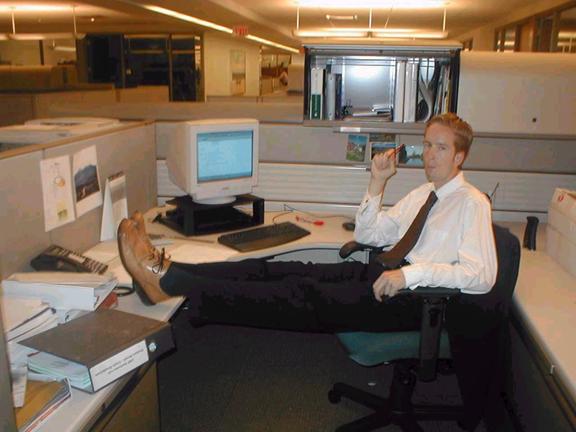
Agneta Palmblad, 54, was born in Stockholm, Sweden, and moved to New York City when she was in her early 20s. Today, she lives in Manhattan and sells antiques at a Manhattan gallery. Agneta, now divorced, has a 23-year-old daughter and a 26-year-old son (who is married). Both of her children live in Brooklyn. Agneta says she loves New York City, but also loves going back to Sweden to visit her family. When terrorists struck on the morning of Sept. 11, Agneta was at home. She went into work – but didn’t stay for long. As she describes, “I was there for only one hour and then had to walk home since there was no transportation. Subways and busses stopped at about 10 or 11 a.m.” She wrote her essay around Feb. 5.
New York City - David became part of my life a bit more than two years ago. After I divorced my husband and my children were no longer staying at home, I decided to rent one of my rooms. I put out a small ad in the Swedish church and David replied. I remember well the first time I opened my door for him and this very tall, blond young Swede entered. He immediately gave the impression of being reliable and honest, just the kind of person I wanted in my home. As I got to know him I never stopped being impressed by his knowledge and wisdom on so many different subjects. He loved to discuss politics in Sweden and here in the U.S. We shared many interests in the arts. And then it was the Chelsea Piers, the big sports center just down the block. He played soccer and was apparently very good at it, along with running. He was very athletic. He had a big beautiful smile and a keen sense of humor. Last summer, after staying at my place for nearly two years, David decided to move to an apartment with some friends, not far away from here. He moved in August and went home to Sweden on vacation shortly after.
That brilliant sunny day Sept. 11 will forever be etched in every New Yorkers’ memory. Where we were, what we were doing. We remember every minute of the day that was like no other day. I had my tea in the kitchen in the morning. I always had the view of the top of the twin towers from my kitchen window. I saw great smoke far away but didn't know quite yet. When reality sunk in, the first thoughts were: where are my two children and then David. Was he still on vacation in Sweden? I hoped and prayed that was the case. Mid-day I tried to reach him on his cell phone. No answer but his voicemail.
The next morning, I decided to walk over to his apartment. I had no phone number, only the address. I got in the small building, not really knowing where I was going. I found the door and a young man opened. “Does David live here?” Yes. I introduced myself and came inside. There were three of his friends. Do you have any news about David? David went to work yesterday and did not come home. The simple cruel words devastated me. There was a slim ray of hope but I came out of the house in a trance-like state. I walked home. There were no busses, only emergency vehicles and police everywhere. Reality had hit.
You want to know how we are coping now. New Yorkers are said to be especially resilient and tough. People became surprisingly warm and humane. Really trying to help out in any possible way. The big frustration for the common New Yorker was the inability of not being able to do “enough.” We got the sudden realisation that the true meaning of life is family and friendships. Needless to say the autumn was very difficult. It seems now almost everything is back to “normal.” But if we scratch the surface, we have many scars. Many of my friends (including me) have trouble sleeping at night. Not all the time, but enough to make you bone tired. There are many concerns and thoughts about both present and future. Then again, my Israeli friend tells me this is the kind of climate that has existed in Israel for years. So were we just naive in the thought of being untouchable?
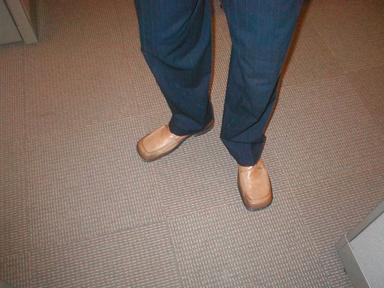
Petra Ebba Maria Ehnar may have lost her older brother on Sept. 11, but David’s spirit is very much alive within her heart. Petra, a 22-year-old engineering student, was born in Stockholm, Sweden, where she resides today. Her family members include her mother, Britt Ehnar; brother, Patric Tengelin; and father, Peter Tengelin. Science, fashion, golf and traveling are some of Petra’s interests. She loves big cities, especially Paris, where she lived for 15 months. When planes struck the World Trade Center on Sept. 11, Petra was in school. She heard about the attack during a break after someone had seen the news on the Internet. She wrote “In Loving Memory of My Brother David: March 18th, 1976 – September 11th, 2001” on March 9.
Stockholm, Sweden – On September 9th I hugged David goodbye at the airport like I have done so many times before, only not aware this was the last time I would ever see or talk to him again. It is like he has gone on a long journey. Sometimes I wonder where he is, and then I realize he is just alive within me. In my mind he is still as vivid as if he were still here.
This is how David described tragedy in a high school essay: “Tragedy is when things are resolved in the worst possible way. Usually there is death involved. The word tragedy is often used when things go from good to bad. For example if a boy who has finished school and has a bright future then suddenly dies.” Tragedy struck and this became his own fate. But had he known his life would be cut short, I still don’t think he would have done anything differently. He enjoyed studying and learning new things. School was an important part of his life, and he loved his college years and the friends he made.
Through the years David has been more than my big brother. He has been my comfort, my role model, my friend, my kindred spirit, and my inspiration and he will continue to be so. Since the day I was born, David has looked after me like a father. We have grown up together and thus shared the better part of our lives. We have always been very close. Having similar features and personalities is in a way painful, but I am very grateful, as I will always see David in myself. I am deeply saddened that we were not able to spend more grown-up time together. I was just about to enter the academic world, his world. He had incredible knowledge and I have learned so much from him. He always worked hard to succeed, which has been a true source of inspiration, and I have tried to do likewise. Now I face a future without his advice, support and encouragement. I wish that he one day could have seen me as an adult and felt proud of what I had achieved. I will always be grateful for any success in life, which in a large part will be due to him. I am so proud of David – my hero. He had many dreams, and his persistence and ambition took him to New York City and the World Trade Center. “It’s like flying up here” was the subject of an email. He was where he wanted to be – on top of the world – working on the 100th floor of the north tower, but it turned out to be a death trap.
I first heard of the terrorist attack in school. The way it was announced felt like a slap in the face. I did not know how massive the impacts were, but when I got home I saw the horrendous events on television. I watched the towers collapse – was David in there? What I feared most, after my brother’s death, was facing my mother the next day. Speaking to her on the phone was heartbreaking. As soon as I boarded the aircraft in Stockholm bound for Gothenburg, tears filled my eyes. A sympathetic man next to me gave me tissues and said, “I think we'll both need these.” He was American. I cried the whole flight. I read the papers and I saw the pictures. The flight attendants came up to see how I was doing and I shared my pain.
We had to wait one week before we could go to NYC. I constantly wanted to lie down and rest. The phone calls were many and my accounts were automatic and based on facts. I was emotionally shattered but unable to express anything due to the state of shock I was in. I just wanted to die and be with David, and I hoped we would all go down with the same flight.
I could probably give a single digit for the number of times I have seen David the past six years, since he has lived in the States, but I’m afraid to count. I grasp for every memory of David. I have 106 emails; suddenly I number everything. Now every object associated with my brother has an immense value. The last photo taken, the last letter written, the last phone call made and the last goodbye said. These are the remains we have left of David.
September 11th will haunt me every single day until I too leave this world. Six months later it still feels surreal, although I experience the enormous consequences. For anyone having lost a loved one, things will never be the same again. It is like having a limb torn away. It doesn't kill you; you just have to learn to live with it, which is even harder because you relive the trauma every day. There will always be something missing, but David will still always be a part of my life.
With love, little sister
Petra Ehnar

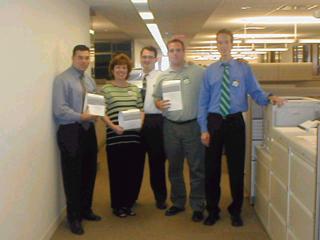
David Tengelin was the first friend Michael Peck had when he moved to New York in 1999. The two had met five years prior in Arizona. Today, Mike, a visual artist, lives in Brooklyn. Below is a piece of art he finished on March 11. It is titled, "In Memory of my Friend, Swede".
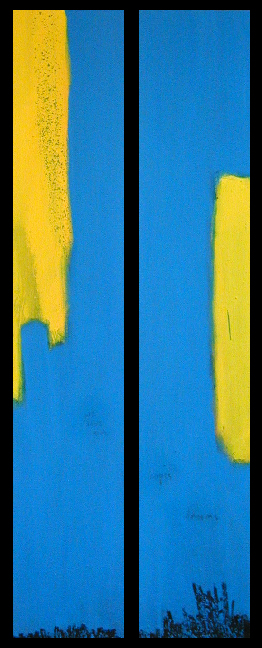
The following are David Tengelin's own words:
Everyone carries at least one novel inside of him or herself, so goes a saying. At the age of 25, I have already gathered enough material for several novels, but if I were to pick just one to be published it would be my move to New York after graduating college. It has all the elements you expect in a great novel.
Throughout college I knew that I wanted to go to either New York or San Francisco after graduation. I had visited the latter regularly and liked its European character (the proximity of things) and mild year-round climate. I did not visit New York until March of 1997, and it was love at first sight. I can vividly remember the day Jared, one of my roommates, and I drove our black Chevy Cavalier over a hill in Jersey to see Manhattan. Awestruck we descended the hill and merged with ten lanes of traffic to squeeze through the Lincoln Tunnel. Spat out at the other end of the tunnel I had shrunk or maybe it was everything around me that was bigger.
January 4, 1999
When the bus left Newark on its last leg of the journey, which had taken me across a whole continent in three days, I was beginning to feel nervous. I had not slept many hours during the trip and the last meal I had was in Effingham, Illinois, a whole day earlier. As soon as I set foot in Port Authority I was approached by a homeless person, whom I shoved aside and pretended to be perfectly comfortable in my new surroundings. I called the hostel and after a heated exchange with the person on the other end I had an address to give to the cab driver. I have not taken a cab since, but on that night it was probably a very wise decision. We passed through the theatre district just as the plays and musicals were letting their audiences onto the sidewalks, and where I didn't see people I saw flashing signs and billboards.
The cab slowed down outside a one-story yellow brick building with a blue door. This was 427 West 12th Street to be sure, but the windows were blacked out as if though they were expecting an air raid and there were no signs of life. As a man who takes precaution I wanted to ask the cab to wait while I checked it out, but I let him go and rung the doorbell. Moments later, I had signed in and was given the tour. As always, I was pleasantly surprised by the hostel and that was a good thing, because I ended up spending five months there. There were three small rooms with three bunk beds in each room and a larger room with many more beds for people who stayed shorter periods of time. The communal areas were in the basement and that is where weary travellers would gather in the evenings in the dark winter months. The place provided a cozy shelter and I enjoyed the company of many of the travellers.
When I first arrived in New York I didn't have my temporary work visa, which I was entitled to after finishing college in the United States. Since I didn't have a work visa I also didn't have a social security number, and without the two you cannot apply for a job. I also did not have a mailing address or phone number of my own.
July 6, 1999
I grab some coffee and a bagel, and then head out the door and down the stairs to the ground floor. I make a right on 21st and uptown on 2nd Ave. I join the flow of people on the sidewalks hurrying to their cubicles. "Walk" means cross. A flashing "Don't walk" means cross, but fast. And when it stops flashing, the bold put their life on the line. The walk to work has all the elements of a car race. I pass her and she trails me. Dogs' leashes create a roadblock and I get held back. The daring crossing earlier is rendered useless. On the corner a "Coffee & Bagel" stand, but who can afford a pit stop on the final stretch.
March 18, 2000
Last Thursday when I came back to the World Trade Center after checking my mailbox down on Broadway I saw Kim Le Pref, one of the owners of Bakers Bounty. She is the one that let me sell bread a couple of times. She was standing in front of her van selling hamentashen, rugulash, black and white cookies and apple turnovers. I felt like going up to her and say:
- I don't want your job anymore. I'm an accountant making thirty grand a year. I live in a building with doormen and not in a hostel. I have to make trips to LA and take cruises to Mexico.
But just seeing her in the square in front of the Twin Towers was enough for me to realise how incredibly far I had come since last March. She was nice enough to hire me and I just couldn't figure out why they wouldn't have me back. I know there were customers who asked me if they could freeze the fuccuci (soft pizza) and I would shrug my shoulders, because I didn't know. I should have nodded instead just to get the sale, but there's the honesty getting in my way again.
March 10, 2001
It's when I walk up to the window in our new offices on the 100th floor of One World Trade Center, that I realise how incredibly lucky I am. I see Manhattan laid out at my feet almost like a roadmap, and every landmark is distinguishable. The fifty-floor skyscrapers crouch humbly; at our height we're alone with the jets.
